|
|
|
Sort Order |
|
|
|
Items / Page
|
|
|
|
|
|
|
| Srl | Item |
| 1 |
ID:
085940


|
|
|
|
|
| Publication |
2009.
|
| Summary/Abstract |
The global development project faces newly evident challenges in the combination of energy, climate and food crises. Their interrelationships create a powerful moment in world history in which analysts and practitioners grope for solutions, limited by the narrow market episteme. This contribution argues that official development, in advocating green market solutions, recycles the problem as solution-a problem rooted in the geopolitics of an unsustainable global 'metabolic rift' and a discourse of global ecology reinforcing international power relations through monetary valuation, and deepening the North's 'ecological debt'.
|
|
|
|
|
|
|
|
|
|
|
|
|
|
|
|
| 2 |
ID:
085930
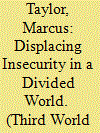

|
|
|
|
|
| Publication |
2009.
|
| Summary/Abstract |
The current triple crisis of food, oil and credit has accentuated social instability across global capitalism, with the most severe effects displaced onto the urban and rural poor who, in the face of escalating prices for staple goods, face deepening immiseration. Mounting social unrest has led the international institutions of global governance to assess the crisis in terms of its security implications. This strategy has two related dimensions. On the one hand, it is part of a discourse that seeks to exceptionalise the current crisis and obscure its social foundations rooted in the evolution of global capitalism in its neoliberal form. On the other, it prepares the ground for interventions that attempt to uphold the status quo of a profoundly uneven global division of labour and consumption. The current crisis, however, reveals not an exceptional situation in need of securitisation, but the degree to which the current global capitalist order inherently displaces insecurity onto marginalised populations in order to reproduce the social conditions for accumulation at a global level. This process of displacement is examined on two levels. First, displacing insecurity is woven into an expanding international division of labour, in which 'cheap labour' is socially constructed and reproduced to toil within a global factory. Second, it is inherent to the consolidation of a global division of consumption in which Western mass consumption displaces ecological costs onto the global majority, creating grave insecurities over future life and livelihoods.
|
|
|
|
|
|
|
|
|
|
|
|
|
|
|
|
| 3 |
ID:
085917


|
|
|
|
|
| Publication |
2009.
|
| Summary/Abstract |
This article critically examines the discourse surrounding fragile states in relation to the security-development nexus. I draw on the case of Haiti to problematise key assumptions underpinning mainstream approaches to resolving concerns of security and development through the contemporary project of state building. In contrast, I suggest that a focus on the social and political relations constitutive of social struggles provides a framework for a better analysis of the historical trajectory of development in-and of-fragile states. Through an alternative relational interpretation of Haitian social and political formations, I illustrate the way in which 'Haitian' experiences of social change have been co-produced in a world historical context. By foregrounding these relational dynamics at key conjunctures coinciding with periods in which the state, state formation and state building, were perceived to be central to Haitian development, this analysis highlights the extent to which attempts to consolidate the modern (liberal) state, have been implicated in the production and reproduction of insecurities. The article concludes by considering the salience of this relationally conceived interpretation of the security-development nexus for gaining insight into the alternative visions of progress, peace, and prosperity that people struggle for.
|
|
|
|
|
|
|
|
|
|
|
|
|
|
|
|
| 4 |
ID:
085937
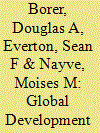

|
|
|
|
|
| Publication |
2009.
|
| Summary/Abstract |
Over the past 30 years rapid advances in the realm of digital technology and the establishment of an ever expanding globally networked communications infrastructure have radically altered the infrastructure of the global economy. Combined with new rules for international finance, the de-regulation of capital and labour markets and the embracing of a 'free trade' ethos by most states in the international system, today's 'information age' bears little resemblance to the economic world experienced by previous generations. Rapid economic changes have been accompanied by the broad dissemination of social, cultural and political information to all corners of the globe, a phenomenon that has contributed to a number of important socio-political developments. Using social movement theory to frame our analytical narrative, we investigate how the demands and pressures of globalisation have helped to foment 'Balik Islam', a religious-based social movement concentrated among the ranks of returned overseas Filipino workers in the northern island of Luzon. These workers, having converted from Catholicism to Islam while employed in the Middle East, are beginning to reshape the political fabric of the Republic of the Philippines, sometimes in a violent fashion. To illustrate the possible extremes of Balik Islam, the article will chart the rise and fall of the Rajah Solaiman Movement, a Balik-Islam group that was responsible for a number of recent terrorist attacks, and whose members, thanks to their ability to blend in with the dominant population, pose a special challenge to democracy.
|
|
|
|
|
|
|
|
|
|
|
|
|
|
|
|
| 5 |
ID:
085941


|
|
|
|
|
| Publication |
2009.
|
| Summary/Abstract |
In this contribution we focus on the political merits as well as limitations of the project of Third Worldism. Through critical historical analysis we identify the difference that Third Worldism made to world politics. At the same time it was without a doubt beset with contradictions from its inception. By foregrounding the contexts of development struggles, we hope to illustrate-at least minimally-these contradictions. From our perspective these are to be found in the politics of emancipatory nationalism. On the one hand, this facilitated a freedom of a kind: recognition and formal equality in world politics. On the other, the institutional form this took was premised on the assumption that national development (especially of the postcolonial states) was somehow independent of wider historical as well as 'transnational' social and political relations. A more relational understanding of the history of development would reveal the extent to which wealth and poverty, order, violence and conflict are outcomes of multifaceted, but combined social and political processes that cannot be reduced to the parameters of the nation-state or the nation-state system. For all its contradictions, Third Worldism articulated a radical political imagination (for its time). However, ironically, to carry forth its underlying concerns, we need to move beyond the territorial imagination and the equation of progress and modernity with the sovereign nation-state to understand why it was a contradictory project. Perhaps, through understanding its contradictions, spaces of hope might be opened up to (re)imagine radical and more humane alternatives.
|
|
|
|
|
|
|
|
|
|
|
|
|
|
|
|
| 6 |
ID:
085926


|
|
|
|
|
| Publication |
2009.
|
| Summary/Abstract |
This article offers an initial framework for a future theory of warlord politics using a simple game theoretic approach. We address the topic abstractly rather than empirically to develop a set of testable propositions across the wide range of warlord regimes. We discuss the reciprocal military and economic foundations of warlord domination, the structural logic of warlord politics, the stability of warlord regimes, and the circumstances that can be expected to lead to the formation and dissolution of warlord coalitions. We offer a conceptual introduction to these topics and lay the groundwork for a more systematic treatment of these and related themes in subsequent work.
|
|
|
|
|
|
|
|
|
|
|
|
|
|
|
|
| 7 |
ID:
085931


|
|
|
|
|
| Publication |
2009.
|
| Summary/Abstract |
This contribution uses insights from the field of critical pedagogy to study North-South power relations. It analyses the attempts of the European Union to promote democracy in the 'developing world', or Global South. The metaphor of development helps to reproduce the idea that Europe is more adult. It thereby assumes the social function of the teacher whose role is to instruct and guide the more child-like countries towards the path of development. Contrary to the prevalent idea that the developing world is 'behind' Europe, the article will argue that, in issues such as cultural hybridization and growth of the informal sector, Europeans could learn about their own futures from their Southern counterparts. To conclude, the article explores the challenges of constructing North-South relations based on the democratic principle of learning together and links these with more general questions of global democratisation.
|
|
|
|
|
|
|
|
|
|
|
|
|
|
|
|
| 8 |
ID:
085923
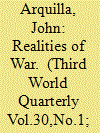

|
|
|
|
|
| Publication |
2009.
|
| Summary/Abstract |
This contribution traces the connection between theories about the utility of violence as a tool of development and practical efforts to craft policies based on such beliefs. The basic finding is that the use of force in the name of societal development (eg the Bush Doctrine of waging war to effect 'regime change') has proven problematic. Indeed, viewed from the perspective of the past two centuries, such uses of force have often turned out to be profoundly 'anti-developmental'. In particular, there are some troubling shifts in conflict, apparent since the late 19th century, but which have accelerated in recent decades. First, major warfare has migrated from the developed to the developing world. Second, there is a clearly observable growth trend towards 'big kill' wars in which at least one million people die (often in small nation-states where significant percentages of the population are killed). More, and more deadly, wars are thus occurring amid those least able to cope with conflict, providing stark rebuttal to recent studies that argue war is generally on the wane. To the contrary, the 'barriers to entry' for waging highly destructive wars have fallen sharply, and it is this trend that poses the greatest threat to political, social and economic progress since the last Dark Age
|
|
|
|
|
|
|
|
|
|
|
|
|
|
|
|
| 9 |
ID:
085939


|
|
|
|
|
| Publication |
2009.
|
| Summary/Abstract |
Citizenship is the cornerstone of Colombian President Alvaro Uribe's democratic security policy. In this paper I ask what kind of citizen is formed under this policy. I examine the premises of citizenship when implemented under the double logic of democracy and security, drawing upon the thoughts of Hannah Arendt and Michel Foucault. My conclusion is that in Colombia the tensions between security and democracy are resolved with a bias towards the security rather than the democracy side of the equation. The consequence is the formation of a citizen less inclined to claim his or her rights politically and more prone to 'voluntary obedience' in return for protection; rather than a lasting peace this engenders a continuation of the barbarisms, this time in the name of securing citizens. I point out that the answers to these contradictions are found in the resistance movements of indigenous and Afro-Colombian communities, peasants, peace communities and the movement of victims of all armed actors. I suggest a framework for analysis inspired by decolonial thinkers
|
|
|
|
|
|
|
|
|
|
|
|
|
|
|
|
| 10 |
ID:
085928


|
|
|
|
|
| Publication |
2009.
|
| Summary/Abstract |
The employment of autochthony discourses has become a prominent feature of contemporary politics around the world. Autochthony discourses link identity and space, enabling the speaker to establish a direct claim to territory by asserting that one is an original inhabitant, a 'son of the soil'. Drawing from recent African examples, this contribution argues that the employment of autochthony discourses is an attractive response to the ontological uncertainty around political identities within the postmodern/postcolonial condition. Autochthony discourses can resonate deeply with populations longing for a sense of primal security in the face of uncertainty generated by a variety of sources, from the processes of contemporary globalisation to the collapse of neo-patrimonial structures. Yet this sense of security is inevitably fleeting, given the instability and plasticity of autochthony claims. The contribution examines why these discourses are often characterised by violence, and argues that autochthony is frequently linked to the desire for order inherent in contemporary state making, which invariably relies on multiple manifestations of violence.
|
|
|
|
|
|
|
|
|
|
|
|
|
|
|
|
| 11 |
ID:
085919
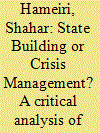

|
|
|
|
|
| Publication |
2009.
|
| Summary/Abstract |
The Regional Assistance Mission to Solomon Islands (ramsi), an Australian-led state-building intervention, has attracted considerable attention in policy-making and scholarly circles world-wide since its July 2003 inception. ramsi was lauded by the Development Assistant Committee of the oecd as a model for good practice to be followed by state builders elsewhere because of its perceived success in halting violent conflict and fostering a return to economic growth. The mission has had its critics too, but much of this criticism has centred on whether it was paying sufficient attention to the Melanesian social and cultural context. Such accounts fail to recognise that ramsi should not be viewed as a technocratic exercise in state building and capacity development by outsiders, but rather as a political project that seeks to transform the social and political relations within the Solomon Islands. This contribution critically examines the nature of this political project by focusing on the ways in which political power is (re)produced. By attempting to narrow the political choices available to Solomon Islanders, ramsi's programmes have ended up limiting the prospects for a sustainable political accommodation to emerge in the Solomon Islands. The deployment of coercive force in moments of acute crisis, as a way of managing the contradictions of attempts to build a 'state' through the production and reproduction of social and political power conducive to this project, reveals that rather than being a recipe for 'good' governance, ramsi remains a form of emergency rule.
|
|
|
|
|
|
|
|
|
|
|
|
|
|
|
|
| 12 |
ID:
085938


|
|
|
|
|
| Publication |
2009.
|
| Summary/Abstract |
For a period that endured so long it came to seem coextensive with Western modernity, durable barriers stood between those who sought political liberation and those who sought spiritual liberation. We are now emerging from that period. The barriers never operated in the same way or to the same extent in all countries, for much the same reason that 'secularism' differed in its effective meaning from country to country. But even in secularism's Anglo-European heartland the division between spirit and politics no longer feels self-evident. This shift cannot help but resonate throughout progressive politics. What we lack are conceptual means for illuminating the shift. The progressive spiritual-political terrain will hardly come into view if it is conceived only in terms of mutual concerns, or shared ethical values, or common campaign work. Pragmatic considerations must be grounded in conceptions of the current world process. Conceptions of the world process must be capable of generating new and fertile responses to many of the deep moral and metaphysical questions which become more insistent in times of rapid-not to say cataclysmic-change. Only in this way can 'progressive social forces', whether belonging to the tradition of the left or to spiritual and religious traditions, help to open up the human vista at a time when 'progress' is pursued nearly everywhere in its narrowest and most lethal forms. This article takes up these issues, emphasising the need for a reorientation of political thought in the face of a world scene stalked by apocalyptic anxieties. The best child of these anxieties may well be an internationally integrative structure which we can refer to as a 'progressive global God-image'. Putting forward this idea as an interpretive key both to the possibilities inherent in the progressive spiritual-political encounter and to important aspects of the contemporary planetary situation, the idea is then illustrated by summarising the key claims of a specific group of 'spiritual internationalists'. In conclusion I suggest that, in so far as the spiritual-political encounter is not joined, contemporary progressives of a spiritual and a traditional leftist kind will continue to represent two forms of 'unhappy consciousness'. The option that beckons, meanwhile, is for each to discover in the other the resources they need to creatively respond to their own limitations.
|
|
|
|
|
|
|
|
|
|
|
|
|
|
|
|
| 13 |
ID:
085929
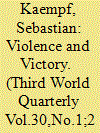

|
|
|
|
|
| Publication |
2009.
|
| Summary/Abstract |
This contribution critically investigates the ideas underpinning the armed struggle of colonial subjects against colonial states in the middle decades of the 20th century. It focuses in particular on two of the most influential texts that inspired and guided violent anti-colonial resistance, The Wretched of the Earth by Frantz Fanon and On Guerrilla Warfare by Mao Zedong. Both Fanon and Mao provided powerful analyses of the violent (psychological and military) underpinnings of colonialism and articulated strategies of resistance. This contribution argues that the persuasiveness of Mao's and Fanon's thought stemmed from their deep dialectical (ie Hegelian) understanding of war and colonialism. By demonstrating the dialectical foundations of Mao's and Fanon's thought-inspired intellectually by their readings of Carl von Clausewitz and Jean-Paul Sartre-the contribution illustrates how their understanding allowed them not only to fathom the interactive dynamics at the core of war and colonialism, but also to devise successful ways of unseating colonial power. Yet, while they shared a common belief in violent anti-colonial struggles, they nevertheless diverged fundamentally in their respective conceptions of violence. Mao (through Clausewitz) held an instrumental view of violence, whereas Fanon (through Sartre) understood violence in existential terms. This meant, as is argued here, that their respective conceptions of violence would not necessarily, on their own, have been sufficient to bring colonialism to an end. Taken together, however, their instrumental and intrinsic conceptions of violence complemented each other and helped armed anti-colonial struggles succeed around the globe.
|
|
|
|
|
|
|
|
|
|
|
|
|
|
|
|
| 14 |
ID:
085908
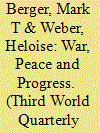

|
|
|
|
|
| Publication |
2009.
|
| Summary/Abstract |
The theory and practice of development has a complicated relationship to the history of war and peace in the 20th century. Efforts to realise the promise of progress have been played out against the backdrop of the crisis of colonialism, national liberation, decolonisation and the rise and fall of Third Worldism. Third Worldism, conceptualised as a specific project to realise the promises of progress, was also affected by the transformation and onset of the crisis of the nation-state system and the re-calibration of the development-security nexus in the post-Cold War era. The short history of the 'three worlds of development' appears now to have been overlaid by global development; that is, a process which entails intensified social and political network-relations, with accompanying regulatory efforts becoming more global in scope and reach. Yet, the most influential drivers and proponents of 'progress' continue to focus on the nation-state as the natural mechanism for the realisation of development, security and to some extent the protection of human rights. A critical reinterpretation, however, of the struggles engendered by this constellation suggests that they are better viewed as struggles for recognition (and redistribution) rather than driven by realising statehood per se. Concurrently, development as an internationally framed global project (underpinned by neoliberalism) has coexisted with alternative conceptions. Collectively, the latter hold out a range of paths-to-progress not-yet-taken at a systemic level, and flag the everyday struggles of denigrated multitudes. This special 30th anniversary issue brings together contributions that seek to revisit the dynamics and complexities of the history of war and peace in relation to the pursuit of progress. The issue as a whole foregrounds contemporary crises of violence and insecurity in relation to core organising principles of world politics; the nation state and the inter-state system and underlying assumptions to realise the promises of progress. That this project is beset with crises and contradictions is recognised by both its advocates and critics. However, there is no consensus on either causal dynamics or potential solutions, despite common acknowledgements of the complexities involved. The first part of this introduction broadly examines the 'crisis' of the state and brings to the fore the need to appreciate the dynamics of social and psychological aspects of these struggles. The second part focuses on the contours of the 'crisis' of global development.
|
|
|
|
|
|
|
|
|
|
|
|
|
|
|
|
| 15 |
ID:
085922


|
|
|
|
|
| Publication |
2009.
|
| Summary/Abstract |
This contribution emphasises the need for a contextual rather than causal analysis of internal wars. Using Sudan's intransigent north-south divide and the crisis in Darfur as case studies, the underlying argument is that, over the course of Sudanese history since independence in 1956, both rebels and regimes have mobilised conditions of conflict to advance their political and economic agendas. The contemporary international system, in which war is understood as both an aberration and a problem with a presupposed solution, compartmentalises the varied and complex interactions of nation-states within a framework that is far from universally applicable. This encourages, even facilitates, the politics of warlordism in internal wars, particularly in the so-called 'developing' nation-states. In Sudan conditions of conflict with self-reinforcing tendencies outweigh the power of existing peace agreements. Issues of resource allocation and political marginalisation provide a volatile context for sustaining the internal wars in Sudan indefinitely and make the success of current or future peace agreements unlikely if not impossible.
|
|
|
|
|
|
|
|
|
|
|
|
|
|
|
|
|
|
|
|
|